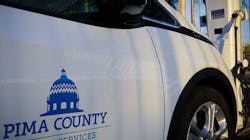TEP Supports Pima County's Fleet Transition with EV Infrastructure
To transition its entire fleet to electric vehicles (EVs) over the next five years, Pima County is getting a boost from Tucson Electric Power (TEP) in modernizing its facilities to support charging stations.
"When we started our program in 2016, we had just a couple of EVs, so we were able to install chargers for those," said Tony Cisneros, Pima County's deputy director of facilities. "But as our EV program grew, we quickly ran out of capacity."
By next year, the county plans to have nearly 160 electric cars in its fleet, replacing conventional vehicles with nearly as many electric light-duty trucks expected to be brought into its fleet as models become available. This will require multiple charging ports at several locations, including some that will require electric service upgrades.
Eight months ago, the county installed nine Level 2 chargers, providing 18 charging ports at the Abrams Health Center. Now the county plans to install another 22 ports at its Public Works parking lot and 40 ports at the downtown Public Service parking garage. In some cases, these locations require the addition of shade structures, fencing or automatic gates, electrical wiring and lighting.
"Our Public Works building has an older garage and there's not a lot of extra electrical capacity there," Cisneros said. "When it was built, EVs weren't even a reality yet. Developing an infrastructure for EV charging is a considerable task."
In a recent memo, County Fleet Services Director Ray Ochotorena estimated that replacing 120 compact and mid-size conventional and hybrid vehicles with EVs could create annual cost savings of US$79,450 for maintenance/repair and US$60,949 for fuel, totaling US$140,399 annually. Over the 12-year estimated useful life of the vehicles, the total cost savings would exceed US$1.6 million, he noted.
TEP is helping commercial customers like the county overcome initial cost barriers by offering rebates of up to 75% of the cost of purchasing and installing Level 2 or dc fast charging stations through its Smart EV Charging Program. Businesses located in low-income areas can qualify for a rebate of up to 85%.
Besides the rebates, TEP provides a site evaluation, an electrical load analysis, and lists of approved chargers and vendors along with technical guidance to help customers.
"The program has been a great success. We had more interest than expected when we launched it at the beginning of the pandemic last year," said Camila Martins-Bekat, TEP senior market development representative. "To date, nearly 60 EV ports have been contracted with 20 installed and we have more than 600 additional ports in the pipeline."
To manage additional electric loads from EV chargers while keeping rates affordable, TEP requires program participants to choose a Time-of-Use rate plan. These plans reward customers with lower rates when they shift EV charging and other energy usage to off-peak hours when overall energy usage is typically lower.
"We worked with the county to understand its fleets' charging needs and were able to design a load sharing configuration that maximized the throughput of the chargers without requiring major upgrades to our grid," said Varun Thakkar, senior EV analyst for CLEAResult, the contractor administering TEP's commercial EV program. However, TEP did install new transformers to support EV charging at two of the county's locations.
"Our plan is all about going green and reducing carbon emissions," said Cisneros. "It's a big commitment. Once you start, you need to follow through. But TEP's program has been very helpful in developing an infrastructure to support our growing EV fleet."
TEP and Arizona Public Service Co. developed an Arizona Statewide Comprehensive Statewide Transportation Electrification Plan with input from key stakeholders to speed the adoption of EVs and build a charging infrastructure. To drive that effort, TEP offers rebates to residential customers who own EVs to install home charging stations, incentives for commercial customers to install EV chargers for employee and customer use, and special rates for EV owners. TEP is also working closely with the City of Tucson and Sun Tran to electrify their fleets.
